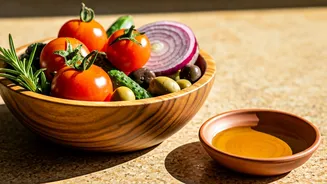What is the Mediterranean Diet?
The Mediterranean diet is more than just a diet; it's a way of life inspired by the traditional eating habits of people living in countries bordering the Mediterranean Sea.
This dietary pattern is characterized by a high intake of plant-based foods, including fruits, vegetables, legumes, and whole grains. Olive oil serves as the primary source of fat, while moderate amounts of fish, poultry, and dairy products are consumed. Red meat and processed foods are limited. A key element is enjoying meals with family and friends, contributing to a sense of community and enjoyment of food. The Mediterranean diet is praised for its ability to promote heart health, reduce the risk of chronic diseases, and support overall well-being. It emphasizes fresh, seasonal ingredients and simple cooking methods, allowing the natural flavors of the food to shine through.
Diabetes Risk Reduction
Numerous studies have shown the remarkable benefits of the Mediterranean diet in reducing the risk of type 2 diabetes. The emphasis on whole, unprocessed foods, particularly those rich in fiber and antioxidants, helps regulate blood sugar levels. Fiber slows down the absorption of sugar, preventing spikes and crashes, while antioxidants combat inflammation, a key factor in insulin resistance. Olive oil, a staple of the Mediterranean diet, also plays a crucial role. Its monounsaturated fats improve insulin sensitivity, making the body more responsive to the effects of insulin. Moreover, the diet's focus on healthy fats, lean proteins, and complex carbohydrates helps maintain a healthy weight, which is essential for diabetes prevention. By adopting the Mediterranean diet, individuals can significantly decrease their risk of developing type 2 diabetes and improve their overall metabolic health.
Indian Plate: Key Adaptations
Adapting the Mediterranean diet to the Indian plate is easier than you might think. Start by increasing your intake of fruits, vegetables, and whole grains. Incorporate seasonal Indian produce into your meals, making sure to include plenty of colorful vegetables and fruits. Swap refined grains like white rice and bread for whole grains such as brown rice, quinoa, and millets like ragi and jowar. Choose healthy fats like olive oil and ghee in moderation for cooking, and limit the use of processed oils. Increase your consumption of lentils, beans, and legumes, which are excellent sources of fiber and protein. Prioritize fish and poultry over red meat, and enjoy dairy products like yogurt and paneer in moderation. By making these simple substitutions and additions, you can transform traditional Indian dishes into heart-healthy, diabetes-friendly meals.
Embracing Plant-Based Foods
A cornerstone of the Mediterranean diet is the abundance of plant-based foods. In India, this aligns perfectly with the rich variety of vegetables, fruits, legumes, and whole grains available. Aim to fill at least half of your plate with plant-based foods at every meal. Explore diverse preparations of vegetables – stir-fries, curries, roasted vegetables, and salads. Incorporate a variety of fruits as snacks and desserts, and emphasize seasonal choices for optimal nutrient intake. Experiment with different types of legumes, such as chickpeas, lentils, and beans, in soups, stews, and salads. Embrace whole grains like brown rice, roti made from whole wheat flour, and other regional grains. By focusing on plant-based foods, you'll benefit from a wealth of vitamins, minerals, fiber, and antioxidants, all essential for maintaining good health and preventing chronic diseases.
Mediterranean-Inspired Recipes
Transform your meals with these Mediterranean-inspired recipes tailored for Indian palates. Consider preparing a refreshing cucumber and tomato salad with a drizzle of olive oil, lemon juice, and herbs. Try a flavorful lentil soup seasoned with Mediterranean spices like oregano and thyme. Experiment with cooking fish with lemon and herbs, or explore chicken preparations using olive oil and spices. Include whole-grain rotis or quinoa with your meals. For breakfast, enjoy yogurt with fresh fruits and a sprinkle of nuts. For snacks, opt for fruits, vegetables, and nuts. These recipes showcase how easily you can incorporate Mediterranean elements into your everyday Indian meals. They are delicious, healthy, and a great way to enjoy the benefits of the Mediterranean diet.
Lifestyle Adjustments for Success
Incorporating the Mediterranean diet involves more than just food choices; it also calls for lifestyle changes. Aim to enjoy your meals with family and friends to cultivate a sense of community and relaxation. Make time for regular physical activity, aiming for at least 30 minutes of moderate-intensity exercise most days of the week. Manage your stress levels through practices like yoga, meditation, or spending time outdoors. Ensure you get adequate sleep, as sleep deprivation can negatively impact your health and dietary choices. Limit processed foods, sugary drinks, and excessive alcohol consumption. By making these lifestyle adjustments alongside dietary changes, you'll be able to unlock the full benefits of the Mediterranean diet and support your overall well-being. Focus on building sustainable habits that promote a healthy and fulfilling life.













